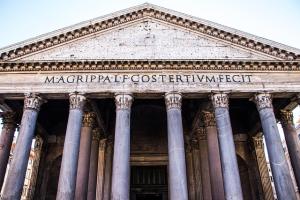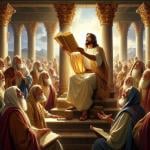
“I contend we are both atheists; I just believe in one fewer god than you do. When you understand why you dismiss all the other possible gods, you will understand why I dismiss yours.” – Stephen F. Roberts.
The above quote by writer Stephen Roberts is intended to imply that atheists and Christians have both rejected the thousands of gods recorded throughout history; only atheism adds the God of the Bible to the list of rejected gods.
This is a reasonable argument and one I address below. Mr. Roberts’ statement also indirectly raises another question. Is it possible for polytheism to be true? Is it possible for there to be more than one God?
Gods Of The Ancient World
For a significant portion of human history, the answer is yes, there are multiple gods. Indeed, the great ancient civilizations such as Mesopotamia, Egypt, Greece, and Rome worshipped a pantheon of gods.
A comment about language. I will refer to the God of the Bible and the monotheistic faiths using a capital “G.” For the various pagan deities, I will use a lowercase “g.” This is in keeping with the grammatical construction of capitalizing proper nouns.
Despite the worship and sacrifices associated with these various gods, the great majority of the polytheistic faiths of the ancient world admitted a hierarchical pantheon. That is to say that there was a “King of the gods,” a being who was considered the supreme deity. Even today, among those belief systems generally defined as polytheistic (often incorporating aspects of pantheism), there is usually a supreme deity. An example is Brahman in Hinduism. Regardless, belief and worship of many gods were exceedingly common in the ancient world.
God Of The Bible
The God depicted in the Bible stands in direct contrast to the gods of the polytheistic civilizations of the time. Where the pagan gods were myths that symbolized various forces of nature, the God of the Bible stands over and above all of creation. It is no defense either to argue that the biblical authors were unfamiliar with the polytheistic pagan civilizations that were prevalent at the time. An example of this is the story of Elijah and Baal. In 1 Kings 18, we read of the prophet Elijah taunting the followers of the pagan deity Baal.
Within the Judeo-Christian tradition, the concept of a single God is given voice in the Shema. “Hear, O Israel: The Lord our God is one Lord.” The Shema is referenced by Christ in Mark’s Gospel. Moreover, in the person of Jesus of Nazareth, the biblical God is also a historical figure. The same cannot be said of the polytheistic gods.
Nevertheless, the question persists. Is it at least possible that more than one God can exist?
A Problem Of Belief And History
The religious and historical nature of Catholicism and the God of the Bible cannot be matched. Whatever one thinks of the Bible’s metaphysical, moral, or religious claims, the people depicted are based on historical evidence.
As mentioned above, no evidence of Hercules or Zeus being historical figures has been found, nor does anyone think it exists. In contrast, there is ample evidence of Jesus as a historical person. It is the difference between myth and history.
There is also the issue of belief or faith. Ancient people did not believe in Shu, Nut, Hercules, Baal, Wearisomu, Enki, Utu, Diana, and the like in the same way that people believe in Christ. The belief in the pantheon of gods was akin to a social construct and not a devotion to God. (See Gods in Ancient Greece and Rome by Matt Dillon).
Owing to this, the numerous Roman emperors could easily deify themselves. It strains credulity to think that the Romans suddenly believed Caesar was a god.
A Philosophical Explanation
I think we are now in a better position to address the statement by Stephen F. Roberts. Specifically, why do Catholics accept the God of the Bible while rejecting the thousands of other gods that various cultures and civilizations have worshiped?
Addressing this question entails defining what the Catholic Church means by the term God. While it is, in principle, impossible to define (place limits upon) that which is infinite, it may be said that God is the absolutely and infinitely perfect spirit who is the Creator of all else. Of course, this definition is not an essential definition since human beings cannot comprehend the essence of God. Rather, the definition is primarily predicated on attributes attributable to God.
The First Vatican Council provides the quintessential statement on the topic. “The holy, Catholic, apostolic Church believes and professes that there is one true, living God, the Creator and Lord of heaven and earth. He is almighty, eternal, beyond measure, incomprehensible, and infinite in intellect, will, and in every perfection. Since He is one unique spiritual substance, entirely simple and unchangeable, He must be declared really and essentially distinct from the world, perfectly happy in Himself and by his very nature, and inexpressibly exalted over all things that exist or can be conceived other than Himself” (Denzinger 3001).
Drawing on theology and philosophy provides further clarification. God is a being whose essence is to exist, and as such, God necessarily exists as a non-contingent being. God’s existence is not dependent on anything or anyone else. In other words, God cannot not exist. God, as a necessary being, stands in direct contrast to the various pagan deities whose existence represented various forces of nature or artificial constructs and, were thereby, contingent.
More Than One?
I want to conclude by augmenting the religious arguments for monotheism with two philosophical arguments.
The first argument is based on the nature of individual substances and the law of identity. Every substance is a particular thing. This allows us, for example, to speak of this chair and not that chair.
Thomas Aquinas argues: “What makes Socrates this particular man is only communicable to one. Therefore, if Socrates were a man what makes him to be this particular man, as there cannot be many Socrates, so there could not in that way be many men. Now, this belongs to God alone, for God Himself is His own nature. Therefore, in the very same way, God is God, and He is this God. Impossible is it, therefore, that many Gods should exist.” (Aquinas, Saint Thomas. The “Summa Theologica” of Saint Thomas Aquinas. 1917).
Second, since God’s essence is to exist, God is non-contingent. It follows, therefore, that He must possess every perfection of being. If many gods existed, they would necessarily differ from each other. A perfection of being would belong to one god and not another. This would mean that the many gods would possess at least one privation of being, which cannot be predicated of a being whose essence contains every perfection.
Conclusion
Proper faith must mean having good reasons to believe something to be true. I hope that this article shows that Catholics have very good reasons for accepting the God of the Bible while simultaneously rejecting the multitude of pagan deities.













